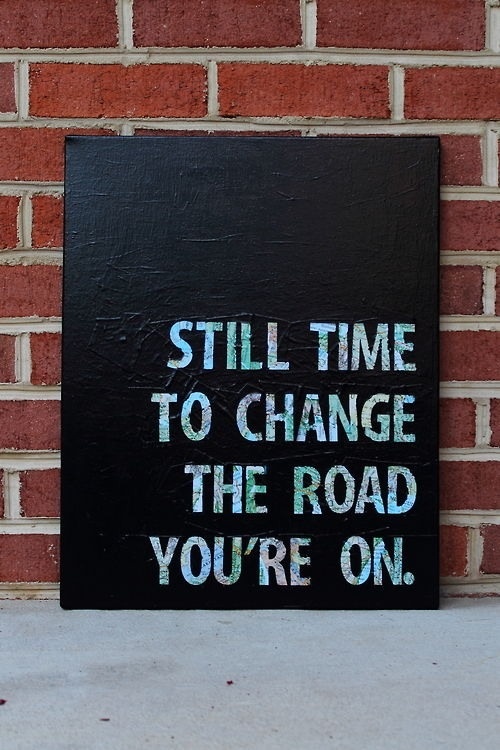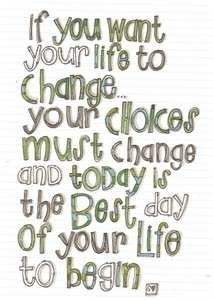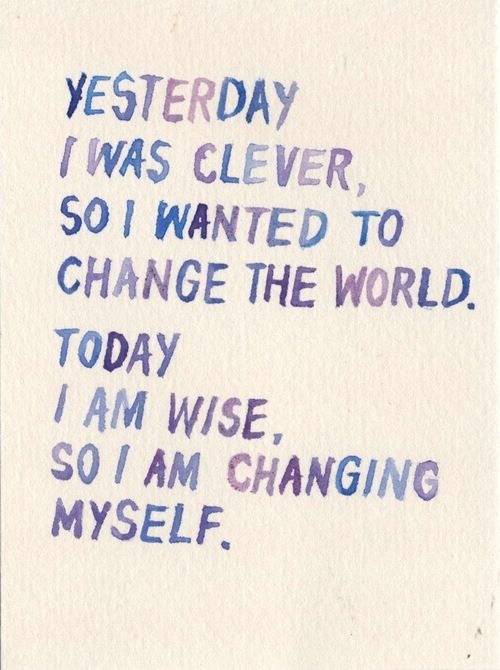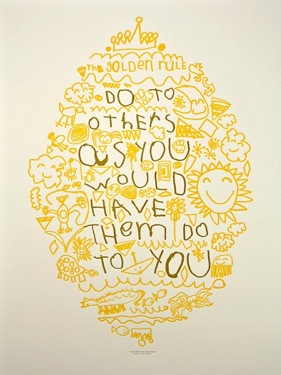
8 Changes We Can Make (That Will Improve Our Life Now)
It is that time of year when we all reflect on our lives and think about our accomplishments or lack thereof. Many of us feel unsatisfied with the progress we have made. Change is not easy at all. Change is uncomfortable and challenging, but it’s a way for us to grow.
Many of us do the same things we did last year; by the end, we wonder why everything is the same. Albert Einstein defined ‘insanity’ as doing the same things repeatedly and expecting a different result. There is truth in that. To make real progress in our lives, we need to look inward and ask ourselves what we need to grow.
Below are 8 proven pieces of advice that can trigger change and, if followed, can help us progress to becoming a better version of ourselves this year and every year.
1. Be Grateful (Adapt an Attitude of Gratitude)
 Be grateful. This is first on the list because it is vitally important. The universe has a knack for giving to those that already have a lot. Do you know why that is? Those that have a lot have this ‘attitude of gratitude. Think of it this way, would you instead give to your cousin Jon who keeps complaining about the gifts you give him every Christmas, or your Aunt Helen, who is so happy no matter what presents you give her because she is grateful that you remember her?
Be grateful. This is first on the list because it is vitally important. The universe has a knack for giving to those that already have a lot. Do you know why that is? Those that have a lot have this ‘attitude of gratitude. Think of it this way, would you instead give to your cousin Jon who keeps complaining about the gifts you give him every Christmas, or your Aunt Helen, who is so happy no matter what presents you give her because she is grateful that you remember her?
The universe acts in the same manner. Wanting to give a gift to someone who is always grateful is natural. We all must be thankful for what we have now to receive what we are asking for in the future. The universe provides abundantly to those with an attitude of gratitude. They invite that greater abundance into their life as they are already happy with what they have, and in turn, they get more abundance. Those with the lack mentality will get more lack.
I learned this lesson, and it changed my life. I was once one of those people that often thought about what I didn’t have instead of what I had already. After adopting the ‘attitude of gratitude, I counted how I could say thank you every day. Oprah Winfrey was a great proponent of acknowledging gratitude with her idea of the ‘Gratitude Journal.’ Here’s how it works:
The Gratitude Journal is a notebook in which we acknowledge at least 5 things we are thankful for everyday. The sentence can start with: “I am grateful for….”. I must say, when I started writing my gratitude journal I could not think of anything to write but as I got into an attitude of gratitude it became super easy that I end up writing up to 15 to 20 things at times! I suggest we all keep this journal and I can attest it truly changed my life.
When we are thankful every day, we embody an attitude of gratitude.
“Be thankful for what you have; you’ll end up having more. If you concentrate on what you don’t have, you will never, ever have enough.” – Oprah
2. Have a Plan (Begin with the end in mind).
In Stephen Covey’s book “The 7 Habits of Highly Effective People,” there is an essential concept of beginning with the end in mind. Imagine yourself on your deathbed when you are old. What would make you feel satisfied and happy that you had accomplished at the end of your life? That can most likely be your legacy or your highest goal.
When we begin with the end in mind we take on the leadership role to pilot our own lives. Having a master plan is similar to having a map of our intended destination. When we have a plan we are more at ease knowing that we can navigate our lives to a destination that we would be happy to arrive at.
Having a master plan enables us to prioritize goals that are important to us. To feel happy and prosperous and, most importantly, in control of our lives, we must have a plan. I have written about this concept and recommend reading my other article, ‘8 Ways to Define and Write Our Goals‘! We must set a goal every year and work towards that goal every day. It’s the best way to fulfill our true potential and innermost dreams.
“Would you tell me, please, which way I ought to go from here?”
“That depends a good deal on where you want to get to,” said the Cat.
“I don’t much care where–” said Alice.
“Then it doesn’t matter which way you go,” said the Cat.
— Alice in Wonderland
3. Stop Complaining (Be Solution-Oriented)
Complaining is a very dangerous symptom. There are indeed times when we must vent, but we must be cognizant that anything more can create nothing but further stress and magnifies the negativity of the situation. Many of us use complaining as an excuse for not taking responsibility of the problem thereby, we keep complaining about the same thing over and over again.
What I call the “8-Minute Rule” is a great way to combat this. The rule states that we can only complain for 8 minutes about a particular situation and in that time we can vent our anger or any other bottled-up feelings. Once the time runs up we never ever complain about it again but instead, focus on becoming solution-oriented and productive and constructively use our time to fix or make the situation better.
Complaining is a great time waster because instead of focusing on the solution to the problem we are set and focused on the problem itself instead of solving it. Successful people rarely complain but instead, take the responsibility to do something to make things better. Complaining is an adverse reaction, and we must realize that we can either change the situation by being solution-oriented and if we cannot change the situation we must change our attitude towards it.
“If you don’t like something, change it. If you can’t change it, change your attitude. Don’t complain.” – Maya Angelou
“Most people with bad attitudes usually point to something other than themselves to explain their problem. But you can’t rightfully blame your attitude on anything or anyone but yourself. It’s not what happens to you but what happens in you that counts.”
— John C. Maxwell, Your Road Map For Success“Blame is based on the negative assumption that something wrong or bad is happening and therefore someone is in error. Taking an attitude of responsibility, on the other hand, requires us to look at every situation as a potentially valuable learning experience.”
— Shakti Gawain, The Path Of Transformation
4. Have empathy.
Do you know the difference between sympathy and empathy? I was recently watching one of my favorite Audrey Hepburn movies “Funny Face” with Fred Astaire. In the movie, Audrey plays a bookstore clerk named Jo Stockton, whose character explains the difference between sympathy and empathy to Fred Astaire’s character. Sympathy is understanding someone’s emotions, while empathy is putting ourselves into someone else’s place and feeling their feelings. It’s a subtle difference indeed but one worth noting. (At that moment, Fred Astaire kisses her and explains that he put himself in her place and that she wanted to be kissed, pretty classic).
Becoming emphatic is placing ourselves in the place of others and feeling what they feel within their current circumstances. When we take sympathy a step further into empathy, we truly become one with the person. Mother Teresa is an excellent example of an empathic person. She was able to put herself into the situation of the people she was helping and, in that instant, transformed herself to become a more loving person towards them. When we practice empathy, we use our imagination to feel the person, whether that person is your loved one or even your enemy.
Practicing empathy is a more profound level compared to sympathy. Sympathy can often lead to pity. Pity is not a great emotion because it often leads to the feeling of superiority — in order for you to have pity, you feel like you are above the person you are helping. Empathy puts us on the same level as the person we are helping and, even more so puts us in their place. Practicing empathy can lead us to understand each other on a deeper more meaningful level and can deepen our relationships with our loved ones.
5. Do the right thing (always).
We feel good about ourselves when we do the ‘right thing’ even when no one knows it. When we don’t, we often feel bad. Our emotion or conscience is a guidance system sort of like an “internal GPS” that indicates how far or how near we are to our true self (you may call it our ‘soul’). For that reason when we do something that is negative we feel wrong to indicate we are far from who we indeed are. When we feel good and happy, it indicates we are one with our true selves.
In order for us to do the right thing we often have to be emphatic (see #4). In this case, doing the right thing can mean following The Golden Rule. The Golden Rule is an idea that is widespread not only in Christianity but throughout other religions such as Buddhism, Judaism, Hinduism, and many more. It states in essence that we should: “treat people the way we would want to be treated”.
Doing the right thing ultimately builds up our integrity. Our integrity is our moral foundation. It is our truest foundation of who we are and what we think of ourselves. When we build a solid foundation we know who we are all about, and we solidify our self-respect and self-esteem.
“Real integrity is doing the right thing, knowing that nobody’s going to know whether you did it or not.” – Oprah
“The swamp plant may grow prodigiously in a short period of time. But there is no inherent strength in it, it is based on muddy ground, its only goal is to outgrow those around it. It is here today, gone tomorrow. The tree on the other hand grows slowly, much more slowly. It is based on firmer ground.
A tree on the mountain develops slowly, according to the law of its being and consequently stands firmly rooted…within is tranquillity, which guards against precipitate action, and without is penetration, which makes development and progress possible.
Relationships that are not built on a basis of right and wrong, of integrity, are on muddy ground and cannot endure. Relationships built on integrity are on firm ground and will grow strong. They will endure and ‘influence the entire landscape’ long after the swamp plants have rotted away in the mud.”
— Wilhelm/Bayens, “I Ching”
6. It’s important to give. (Give to receive).
Like the Law of Attraction, there is another important law that we must recognize which is: The Law of Receiving. The Law of Receiving states that in order for us to receive, we must first give. I believe there is a reason for this since giving is an abundant-affirming activity. Let’s use the metaphor of money for a second. Money is an excellent example of universal energy. One of the lessons we should learn is that in order for us to invite money into our world, we must feel abundant. The way to do that is to let go of the scarcity mentality by giving our money to make the world better, one way to do that is through charity.
When we give of ourselves and of our money, we invite more into our lives. Money is synonymous with water. When we hold water in a container for a long time without replenishing it that water becomes stagnant and goes wrong. However, when we let it pour out, the universe fills it with more, and it becomes fresh and alive. (We can think of the container of water as our capacity for wealth, some of us have limiting beliefs, and often the container is small). Giving to charity benefits those in need and helps us exercise our abundant mentality.
Note however that when we give we should give to feel abundance, not scarcity. There is a right way to share to invite abundance into our lives. Giving too much that you do not have enough and you feel the scarcity is the wrong way to do it.
“For it is in giving that we receive.”
— St. Francis of Assisi
7. Be optimistic (Be lucky and expect great things).
There are people that see the world as a glass half-empty, and there are people who see it as a glass half-full. Seeing the world as a glass-half-full is a better approach because it is optimistic. When we expect good things to happen, they often do. If we expect the opposite of what we want to happen, then we usually get that too. This is the Law of Attraction at play.
When we are optimistic about the world, we feel a great sense of hope and relief. If we are the type of people that are often pessimistic, the next best thing we can do is to not expect anything at all. It is far better to have no expectations than expect the worst will happen. Think about it this way, when we expect something good to happen we feel good. When we expect something terrible to happen, we usually get tense and feel bad. Our emotion is an indicator of our most authentic self and feeling bad is like swimming against the current of life. If we let go (have no expectations), the current will take us to the path of least resistance.
Here’s more: optimistic people create their luck. Richard Wiseman conducted a ten-year study on lucky people and found that lucky people are often happy and expect to be lucky. In one experiment, he took a group of people that felt they were lucky and unlucky people. Using a newspaper he assigned a task to both groups to count how many photographs were inside the newspaper. On average, the unlucky person took two minutes to count, while the lucky person took mere seconds. Why? In the newspaper, Wiseman put a message: “Stop counting. There are 43 photographs in this newspaper.” This message took half the page. In addition, Wiseman added another message: “Stop counting. Tell the experimenter you have seen this and win £250.” Read more here.
Lucky people are more optimistic and, therefore more open to opportunities while unlucky people are tenser and miss these opportunities because they are too focused on looking for something else. When we become more optimistic, we expect great things to happen and they often do.
“My research revealed that lucky people generate good fortune via four basic principles. They are skilled at creating and noticing chance opportunities, make lucky decisions by listening to their intuition, create self-fulfilling prophesies via positive expectations, and adopt a resilient attitude that transforms bad luck into good.” – Richard Wiseman
8. Be true to yourself.
In order for us to be true to our self, we need to know who we are and what is all about. I don’t think this process is something that happens in an instant where we *poof* know everything about ourselves at once. No, this process is a gradual one that occurs from day to day and from moment to moment. When we are tested at our wit’s end or when we lose a friend or a loved one, or when we are charged in a place of responsibility. It’s a chipping off of a block, and we are the sculptor of our lives and what we produce is something resembling who we want to become.
Being true to ourselves can be a tricky thing, especially if we care more about what everyone thinks about us. But I believe as a society, we are slowly changing to embrace differences and mind our own business. Finally, realizing it is not our business in the first place. There is only three business in the world, as taught by Byron Katie, that is 1. your business, 2. other people’s business, 3. God’s business (substitute God for Source, Higher being, etc. if you prefer). And we need to stay away from any business that is not our own. We can’t command the weather by asking the sky to stop raining because it’s not our business. We can’t do the same with other people’s business (aside from forcing or coercing or influencing of course).
We must know where we stand by building a foundation first (see #5) and, from day to day, strive to aspire to our ideal self. Every moment, every day, and every year, we should strive to create a better version of ourselves. That does not mean we do not fail sometimes, but we must be vigilant and get back up. When we give up and do not become better, we stagnate. It’s those moments when you suddenly look in the mirror and donot like who you see. To be yourself is a saying that is often said but the addendum should be “be your better self”.
“Find out who you are and do it on purpose.”
— Dolly Parton
“You don’t need anybody to tell you who you are or what you are. You are what you are!”
— John Lennon

I hope you enjoy this article. Please leave a comment below to leave us your favorite advice or words of wisdom that has resonated with you and changed your life for the better. Namaste :).















